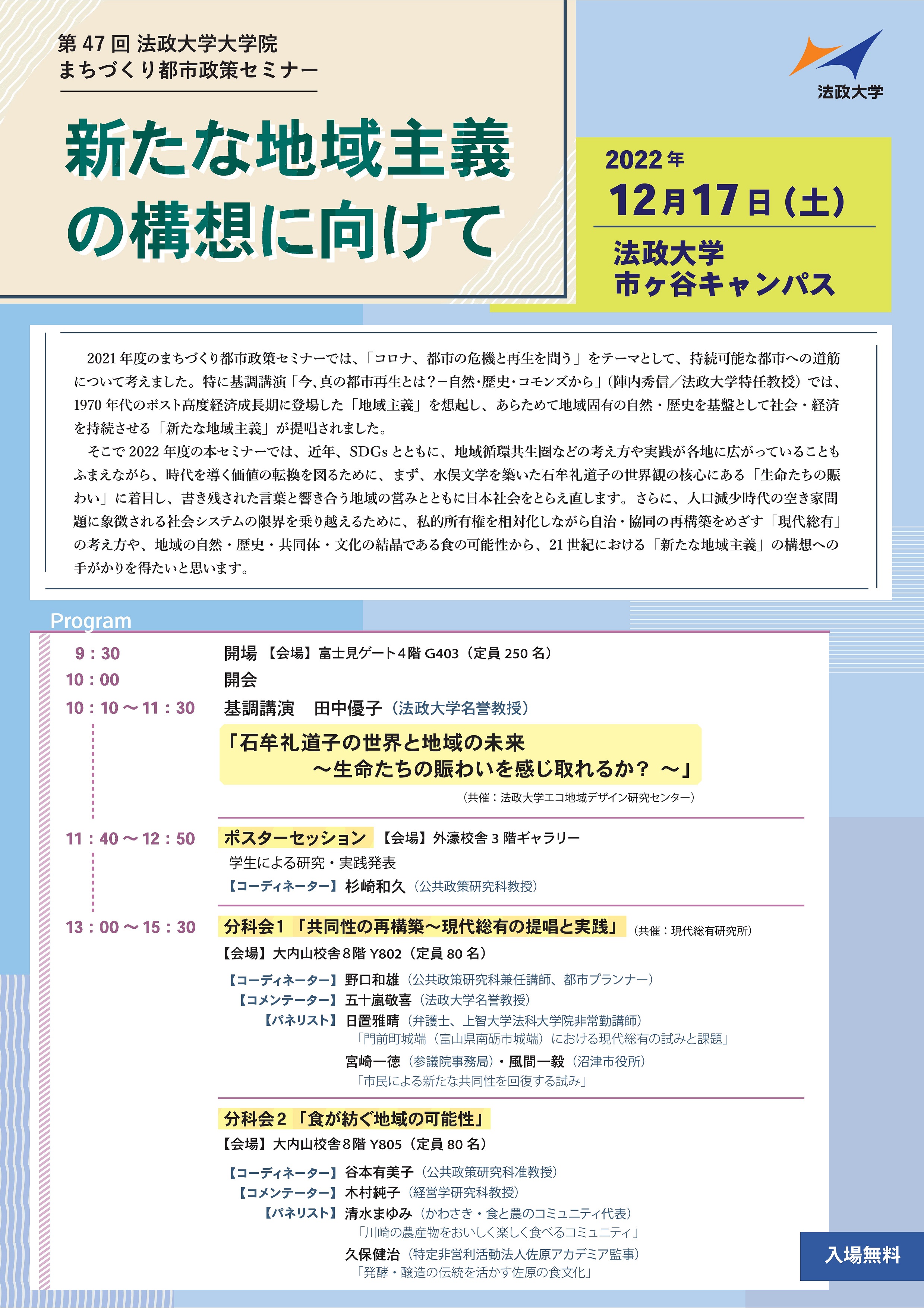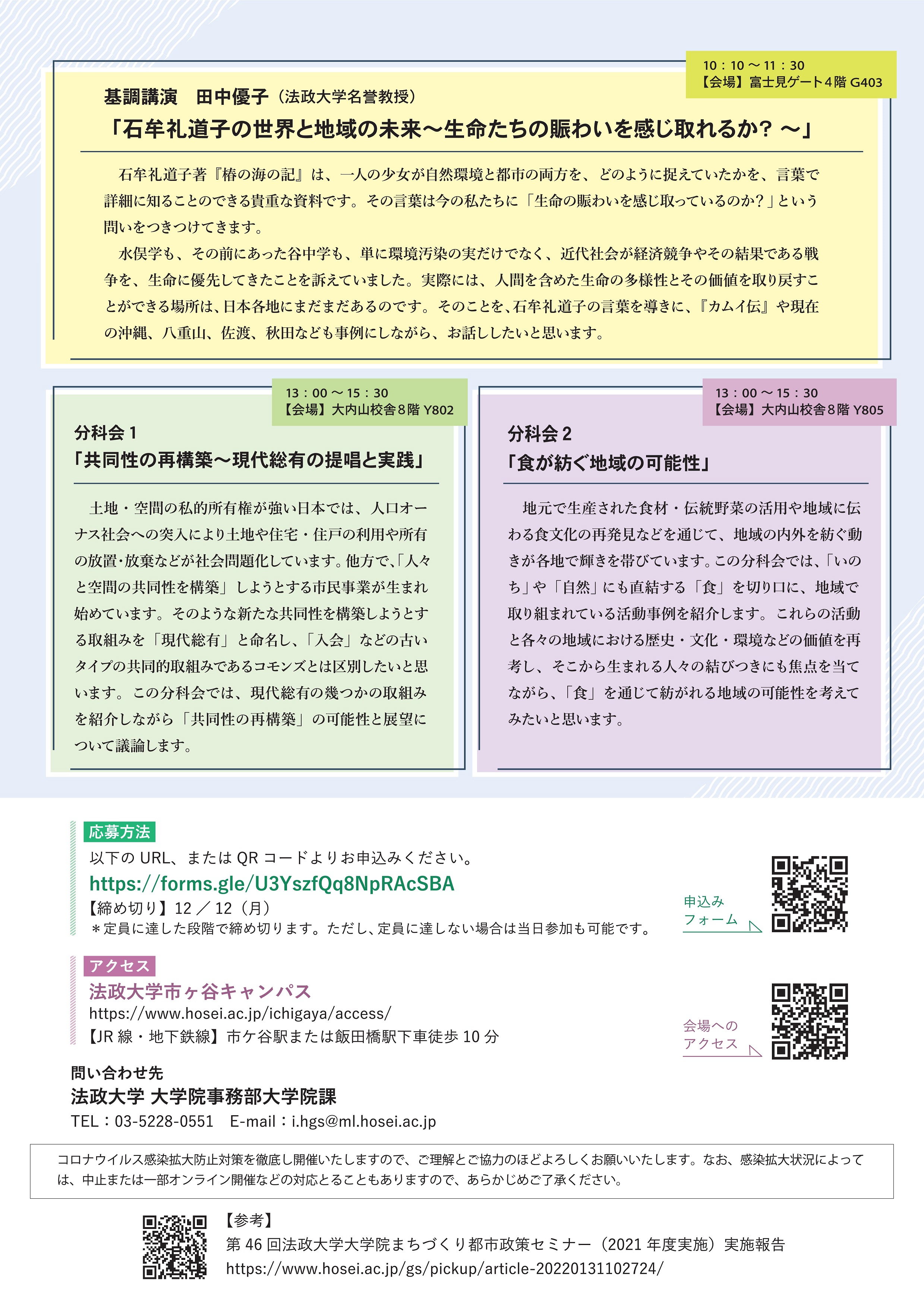PickUP
The 47th Hosei University Graduate School Seminar on Urban Planning and Urban Policy to be held (12/17)
- October 24, 2022
Toward a New Regionalism Concept
The theme of the FY2021 City Planning and Urban Policy Seminar was "Corona, Questioning Urban Crisis and Regeneration" and considered pathways to a sustainable city.
In particular, the keynote speech, "What is true urban renewal now? (Hidenobu Jinnai, Specially Appointed Professor, Hosei University) recalled the "regionalism" that emerged during the post-high economic growth period of the 1970s, and advocated a "new regionalism" that sustains society and economy based on the nature and history unique to each region.
In this seminar in FY2022, we will first focus on the "liveliness of life" at the core of the worldview of Michiko Ishimure, the founder of Minamata literature. We will reconsider Japanese society in conjunction with the activities of local communities that resonate with these words.
Furthermore, in order to overcome the limitations of the social system symbolized by the problem of vacant houses in an era of declining population, we would like to obtain clues to the concept of a "new regionalism" for the 21st century from the idea of "modern total ownership," which aims to rebuild autonomy and cooperation while relativizing private property rights, and the potential of food, which is the fruit of nature, history, community and culture in the region. We hope to gain clues to the concept of "new regionalism" in the 21st century.
- The seminar will be held after taking thorough measures to prevent the spread of coronavirus infection.
- Please note that the registration may be switched to online depending on the spread of the infection. In that case, we will contact the applicant's e-mail address before the day of the event.
- Opening (10:00~)
- Opening Remarks
- Location: Fujimi Gate, 4th Floor, Room G403 (Capacity: 250 people)
- Keynote Speech "The World of Michiko Ishimure and the Future of the Region: Can you sense the buzz of life and others? -" ( 10:10 - 11:30)
Michiko Ishimure's book "Tsubaki no Umi no Ki" is a valuable source of detailed information about how one young girl perceived both the natural environment and the city in her own words. Her words pose a question to us today, "Do we sense the buzz of life?" Are we sensing the bustle of life?
Both Minamata Gaku and the Tanichu Gaku that preceded it were not merely concerned with the fruits of environmental pollution, but also with the fact that modern society has given priority to economic competition and the resultant wars over life. In fact, there are still places throughout Japan where the diversity of life, including human beings, and its value can be restored. I would like to talk about this, using the words of Michiko Ishimure as a guide, as well as "Kamui Den" and current Okinawa, Yaeyama, Sado, and Akita as examples.
- Lecture: Yuko Tanaka (Professor Emeritus, Hosei University)
- Place: Fujimi Gate, 4th Floor, Room G403 (Capacity: 250 people)
- Co-organized by: Hosei University Research Center for Eco-regional Design

- Student Poster Session (11:40-12:50) *Reservation not required
- Place: Sotobori Bldg. 3rd floor gallery
- Coordinator: Kazuhisa Sugisaki (Professor, Graduate School of Public Policy and Social Governance )
- Section Meeting 1 "Rebuilding Communalities: Advocacy and Practicality of Contemporary So-ownership" (13:00-15:30)
In Japan, where private ownership of land and space is strong, the neglect and abandonment of the use and ownership of land, housing and dwelling units are becoming social problems as the country enters a society of population oasis. On the other hand, citizen projects that seek to "build community among people and space" are beginning to emerge. I would like to name such efforts to build a new community as "Contemporary Collective Ownership" and distinguish them from the commons, which is an older type of communal effort such as "membership. In this sectional meeting, we will discuss the possibilities and prospects of "reconstruction of community" while introducing some of the efforts of "Contemporary Sougyou.
- Place: Room Y802, 8th floor, Ouchiyama Campus (capacity 80 people)
- Co-organized by Gendai Soyo Institute
- Coordinator: Kazuo Noguchi (Adjunct Lecturer, Graduate School of Public Policy and Social Governance, Urban Planner)
- Commentator: Keiki Igarashi (Professor Emeritus, Hosei University)
- Panelists:
- Masaharu Hioki (Attorney at Law, Part-time Lecturer, Sophia University Law School)
"Attempts and Challenges of Modern Soyo in the Gate Town of Johata (Johata, Nanto City, Toyama Prefecture) - Kazunori Miyazaki (Secretariat of the House of Councillors), Kazutake Kazama (Numazu City Hall)
"An Attempt to Restore a New Community by Citizens"
- Masaharu Hioki (Attorney at Law, Part-time Lecturer, Sophia University Law School)
- Section Meeting 2 "Regional Potential Spun by Food" (13:00-15:30)
Movements to weave together the inside and outside of the region through the use of locally produced foods and traditional vegetables and the rediscovery of food culture handed down in the region are gaining luster in various regions. In this session, we will introduce examples of activities being undertaken in local communities with a focus on "food," which is directly related to "life" and "nature. We will reconsider the value of these activities and the history, culture, and environment of each region, and while focusing on the ties among people that are created through these activities, we will consider the possibilities of regions that are spun out through "food.
- Place: Room Y805, 8th floor, Ouchiyama Campus (capacity 80 people)
- Coordinator: Yumiko Tanimoto (Associate Professor, Graduate School of Public Policy and Social Governance )
- Commentator: Junko Kimura (Professor, Graduate School of Business Administration )
- Panelists:
- Mayumi Shimizu (President, Kawasaki Food and Agriculture Community)
"A community that enjoys eating Kawasaki's agricultural products in a delicious and fun way - Kenji Kubo ( Auditor NPO Sawara Academia)
"Sawara's Food Culture to Utilize the Tradition of Fermentation and Brewing"
- Mayumi Shimizu (President, Kawasaki Food and Agriculture Community)

| Theme | Toward a New Regionalism Concept |
|---|---|
| Date | Saturday, December 17, 2022 |
| Place |
Hosei University Ichigaya Campus
|
| Program |
10:00-10:10 Opening / Fujimi Gate, 4th Floor, Room G403 |
| Participation Fee | Free of charge |
|
Registration |
If you are interested in attending If you wish to attend, please register here. If you wish to attend the seminar, please register here. |
|
Others |
|
Contact Us
Graduate School Division, Hosei University
TEL: 03-5228-0551
E-mail: i.hgs[at]ml.hosei.ac.jp
Please replace [at] with "@".

